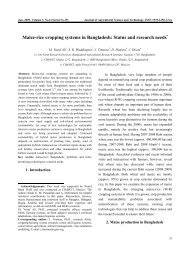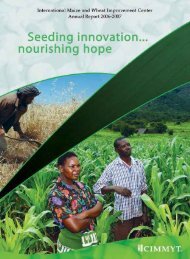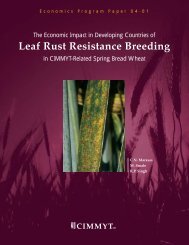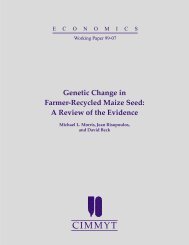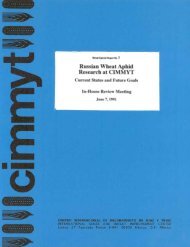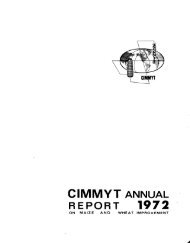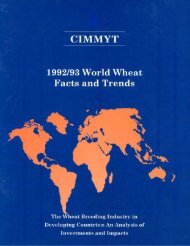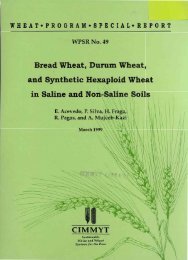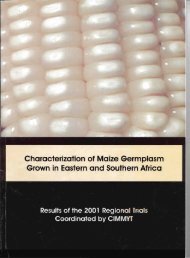the Symposium on Wheats for More Tropical Environments - cimmyt
the Symposium on Wheats for More Tropical Environments - cimmyt
the Symposium on Wheats for More Tropical Environments - cimmyt
- No tags were found...
You also want an ePaper? Increase the reach of your titles
YUMPU automatically turns print PDFs into web optimized ePapers that Google loves.
291IV. SeedWheat Seed Producti<strong>on</strong>,Storage and Distributi<strong>on</strong> in BangladeshS.M. Ahmed, Bangladesh Agricultural Research Institute,Joydebpur, Dhaka, BangladeshAbstractThe initial expansi<strong>on</strong> of high-yielding varieties of wheat in Bangladesh wasfacilitated by importing seed. However. researchers realized that it would beimpOSSible to increase and sustain wheat producti<strong>on</strong> without an efficient seedproducti<strong>on</strong>. preservati<strong>on</strong> and distributi<strong>on</strong> system within <str<strong>on</strong>g>the</str<strong>on</strong>g> country. Importedseed would not be a dependable source due to possible unavailability of<strong>for</strong>eignexchange<strong>for</strong> its purchase. <str<strong>on</strong>g>the</str<strong>on</strong>g> possibility of<str<strong>on</strong>g>the</str<strong>on</strong>g>re being inadequate quantities ofseed ofappropriate varieties available<strong>for</strong> purchase, and possible delays intransport and distributi<strong>on</strong> which would hinder timely planting in <str<strong>on</strong>g>the</str<strong>on</strong>g> country. Inview of<str<strong>on</strong>g>the</str<strong>on</strong>g>se problems. <str<strong>on</strong>g>the</str<strong>on</strong>g> development oflow-cost technology<strong>for</strong> seed storageunderfarmers' c<strong>on</strong>diti<strong>on</strong>s. as well as <str<strong>on</strong>g>the</str<strong>on</strong>g> establishment of nati<strong>on</strong>al seedproducti<strong>on</strong> agencies, was imperative. The producti<strong>on</strong>, storage and distributi<strong>on</strong> ofwheat seed are here discussed asfactors which have c<strong>on</strong>tributed to <str<strong>on</strong>g>the</str<strong>on</strong>g>dramatic expansi<strong>on</strong> of<str<strong>on</strong>g>the</str<strong>on</strong>g> area under wheat in Bangladesh.In Bangladesh, <str<strong>on</strong>g>the</str<strong>on</strong>g> initial expansi<strong>on</strong> ofhigh-yielding varieties of wheat wasfacilitated by <str<strong>on</strong>g>the</str<strong>on</strong>g> importati<strong>on</strong> of seed.Envir<strong>on</strong>mental c<strong>on</strong>diti<strong>on</strong>s, such as <str<strong>on</strong>g>the</str<strong>on</strong>g>short growing seas<strong>on</strong>. high humidityand possible premature m<strong>on</strong>so<strong>on</strong> rains.were <str<strong>on</strong>g>the</str<strong>on</strong>g>n thought to precludesuccessful seed producti<strong>on</strong> in <str<strong>on</strong>g>the</str<strong>on</strong>g>country. However, research pers<strong>on</strong>nelrealized that it would be impossible toincrease or sustain <str<strong>on</strong>g>the</str<strong>on</strong>g> wheatproducti<strong>on</strong> area without an efficientseed producti<strong>on</strong>, preservati<strong>on</strong> anddistributi<strong>on</strong> system within <str<strong>on</strong>g>the</str<strong>on</strong>g> country.The reas<strong>on</strong>s <strong>for</strong> this were:• Foreign exchange might not beavailable <strong>for</strong> seed imports every year;• Adequate quantities of seed ofappropriate varieties might not beavailable <strong>for</strong> purchase, and• Delays in arrival of seed and itsinternal distributi<strong>on</strong> could hinder <str<strong>on</strong>g>the</str<strong>on</strong>g>timely planting essential <strong>for</strong> goodyields;In view of <str<strong>on</strong>g>the</str<strong>on</strong>g>se problems, <str<strong>on</strong>g>the</str<strong>on</strong>g>development of low-cost technology <strong>for</strong>seed storage under farmers' c<strong>on</strong>diti<strong>on</strong>s.as well as <str<strong>on</strong>g>the</str<strong>on</strong>g> establishment of anati<strong>on</strong>al seed producti<strong>on</strong> agency. wasimperative. Surveys c<strong>on</strong>ducted in 1976(1) and 1977 (8) indicated that about80% of <str<strong>on</strong>g>the</str<strong>on</strong>g> seed required annually wasstored by farmers. Had <str<strong>on</strong>g>the</str<strong>on</strong>g>y not storedwheat seed. <str<strong>on</strong>g>the</str<strong>on</strong>g> dramatic expansi<strong>on</strong> of<str<strong>on</strong>g>the</str<strong>on</strong>g> area under wheat would not havebeen possible.In spite of <str<strong>on</strong>g>the</str<strong>on</strong>g> spectacular success of<strong>on</strong>-farm storage, some seed is alwayslost due to spoilage caused by earlyrains. insect and rat damage. flooding.loss of Viability due to <str<strong>on</strong>g>the</str<strong>on</strong>g> failure orinability of <str<strong>on</strong>g>the</str<strong>on</strong>g> farmer to dry his seedstock. or c<strong>on</strong>sumpti<strong>on</strong> of <str<strong>on</strong>g>the</str<strong>on</strong>g> seedbecause of <str<strong>on</strong>g>the</str<strong>on</strong>g> failure of <str<strong>on</strong>g>the</str<strong>on</strong>g> rice crop.Also. <str<strong>on</strong>g>the</str<strong>on</strong>g> demand <strong>for</strong> wheat seedincreases or decreases depending <strong>on</strong>wea<str<strong>on</strong>g>the</str<strong>on</strong>g>r c<strong>on</strong>diti<strong>on</strong>s. For example. since60 to 70% of <str<strong>on</strong>g>the</str<strong>on</strong>g> wheat crop is rainfed,favorable rains just prior to <str<strong>on</strong>g>the</str<strong>on</strong>g> wheatseas<strong>on</strong> make more land available <strong>for</strong>planting, and <str<strong>on</strong>g>the</str<strong>on</strong>g> demand <strong>for</strong> seed willbe high. Thus. a str<strong>on</strong>g nati<strong>on</strong>al(private or public) seed producti<strong>on</strong> ef<strong>for</strong>t




